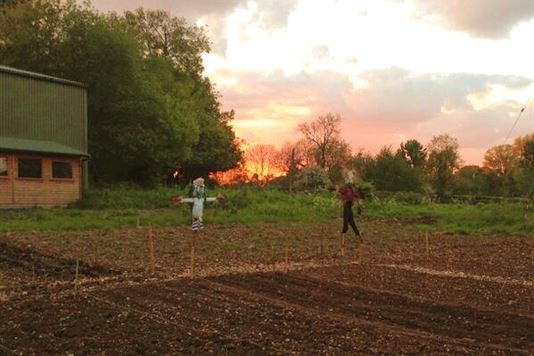
Would you like to work with your local farmer and community to grow fresh food? We explore the Community Supported Agriculture (CSA) scheme.
The Community Supported Agriculture scheme is essentially a partnership between local communities and their farming neighbours in which the benefits, risks and rewards are shared. Sound like something you're interested in? Read on to learn more and discover how to get involved.
What are the aims?

Rachel Harries, Co-ordinator of The CSA Network, said: “We see CSA as a really good approach to local food production. And for supporting sustainable farming.”
The charter for the CSA Network, which is available to view on the Soil Association’s website, gives a more specific definition for CSAs in the UK: “Any food, fuel or fibre producing initiative where the community shares the responsibilities and rewards of production in a spirit of mutual trust and openness. Whether through ownership, investment, sharing the costs of production, or provision of labour.”
One such example is the FoodSmiles CSA in St Albans, Hertfordshire. Member of the group Tom Carman said that it's “almost like a veg-box scheme, but instead of sourcing the food from farms all over the place, you grow the food yourself.”
How does it work?
If members invest £50 in the scheme, they agree to come to two work 'parties' a month (the working kind of 'party', not the balloon kind), which constitutes three to four hours of hard graft on the farm. If they invest £100, they’ll just need to come to one. Everyone gets one share of the harvest a week.
However, as the crops are currently still growing, there’s currently no food to put into FoodSmiles veg-boxes. So a bit of time is a necessary part of the investment needed before CSAs can (literally) reap what they sow.
Tom says that FoodSmiles’ 15 members have “very strong enterprise principles; it’s not just a community growing project.” They try to run the project “like a business, like a co-operative” to ensure its longevity.
This video of a different CSA, Chagford’s Chagfood project, might help shed more light on CSAs as a whole:
Benefits for everybody
Communities might receive regular veg-boxes, a supply of organic meat or fresh bread, or even buy shares in a cow and receive 'interest' in cheese. Because of the scheme’s open-ended direction, it’s hard to say precisely what you’ll get out of it, but it’ll be fresh and local produce whatever the case.
Farmers can produce vegetables or meat for a group of members who pay up front, guaranteeing them an extra source of income. The Soil Association also suggests that farmers rent a field to a project for them to grow their own produce; or that farmers ask for help from enthusiastic members of their local group for tasks on the farm like sowing, weeding, harvesting and packing. The last of these points did raise an important question: would farmers take volunteers over the expense of a labourer’s wage?
No, says Rachel, because although organic farms will take on volunteers, including ‘WWOOFers’, they will generally also need paid skilled workers.
For those wondering, ‘WWOOFers’ are those involved in a scheme called World Wide Opportunities on Organic Farms. It involves people working a set amount of hours a week on organic farms in the UK and/or abroad in return for bed and board.
Hopefully, CSAs will bring local farmers and their communities closer together. Rachel suggests that there’s “a balance to be struck" between ensuring the economic viability of the farm, and ensuring community engagement.
Guidance for new starters
“We hope that we can offer as much support as possible to new CSAs that are up-and-coming," says Rachel. "We’ve got a huge amount of resources on our website that can give someone a really good idea and a lot of useful tips on how to set something up and how to take it forwards."
What might be useful for those interested in setting up a new CSA is to actually visit one. The Soil Association is working with CSAs that are already doing really well to help them run events, which can both generate income for them and attract new customers.
Setting up a CSA
Funding
There are numerous groups and people you can approach to try and secure initial funding for a CSA. FoodSmiles got a £500 grant from their local county councillor’s locality budget, and Parish Councils can also offer money.
There are independent organisations that can help, too. Vegware gives direct support to non-profit groups through its Vegware Community Fund on an ongoing basis.
For more advice, visit the Soil Association’s funding opportunities page.
Meeting
As they’re community-led schemes, you might already know of some friends and neighbours who would like to get involved in setting up a CSA with you.
Holding a launch event for exposure of the group might be a good idea (that’s what FoodSmiles did).
If you’re interested
If you happen to live in St Albans or nearby and want to learn more or become part of the FoodSmiles team, Tom says that you’re welcome to visit the farm. Contact foodsmiles.info@gmail.com to learn more and arrange a visiting time.
You can read all about CSAs on the Soil Association’s website, and find a CSA using their UK search tool. If you don’t have one near you and would like information about setting up your own, find sources of help here. For detailed information, read the articles listed in the 'essential reading' section of the Soil Association's CSA pages.
There is also a crowdfunding page for the CSA Network here. Money pledged will go towards developing a new website for the network, CSA events across the UK, and the cost of holding a national CSA conference.
All pictures courtesy of FoodSmiles.
You might also like:
